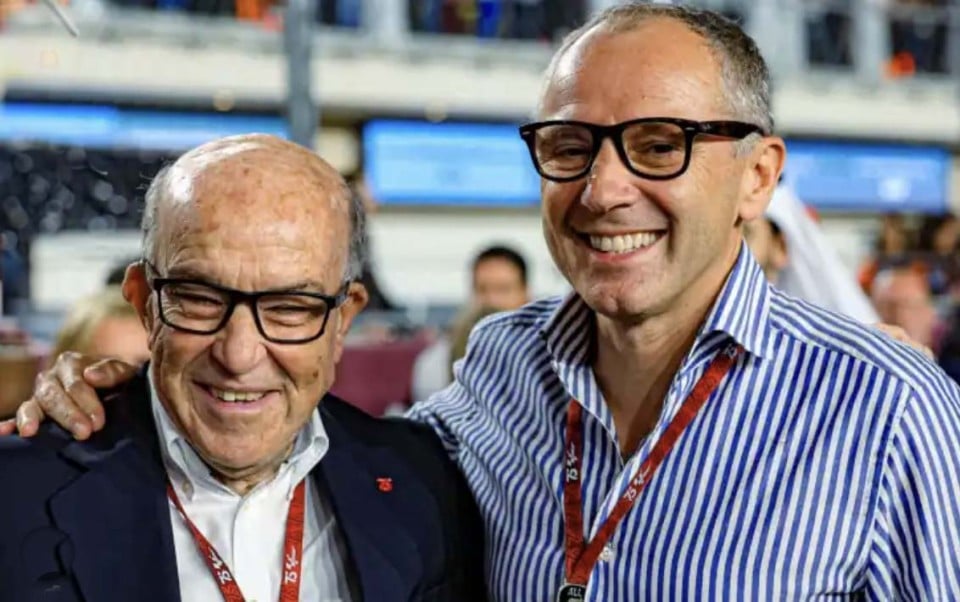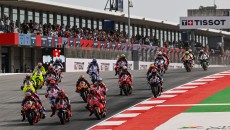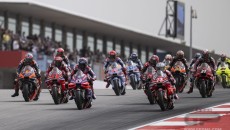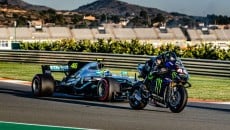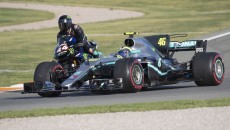The rumour had been going around for days that the announcement of MotoGP's handover to Liberty Media would come at the Austin GP, the new commanders of the ship instead chose April 1 and it is no prank even though the communiqué came on what is called 'All Fools' Day' in the USA.
The acquisition of 86 percent of Dorna will be finalized during 2024 and, from what the communiqué says on the surface, it would seem that the transition from Dorna to Liberty would take place with a policy of Leopardi-like memory: change everything to change nothing.
It reads: This new agreement will see Dorna Sports S.L., the exclusive commercial and television rights holder of MotoGP™, remain an independently run company attributed to Liberty Media’s Formula One Group tracking stock. Carmelo Ezpeleta, who has been CEO since 1994, will remain in his position and continue to run the business with his management team. The business will remain based in Madrid.
In fact, the latter is a logical transition, identical to the one that handed F1 over to Liberty Media in 2016, leaving Bernie Ecclestone at the helm. Bernie then hastened, however, to add, "I will stay for at least two, three more years before I start calling it a day."
In fact, Ecclestone's interregnum lasted much less, and in late January 2017 Bernie corrected his tirade: "I've been fired, now all I have to do is leave. I take it as official: I no longer lead the company and my position has been taken over by Chase Carey."
Will the same happen with Carmelo Ezpeleta who has repeatedly said he cannot and will not compare himself to Ecclestone? Who can say? Both, in fact, have been master-father of the sport they have managed, Bernie for 40 years, Carmelo since 1994.
There are many similarities in the careers of the two: both raced, both were men of power in their respective structures and delegated little, in the sense that they always made the important decisions themselves. Ecclestone liked Italians and put several of them in positions if not of power, at least of responsibility, think of Gardella to Lattoneddu. Ezpeleta, although there are several Italians in Dorna, has kept things much more in the family, and for that reason he has been much criticized even within the paddock.
The fact is that the world of four wheels is profoundly different from the world of two, and not only because it is infinitely richer. More money, in fact, allows for the emergence of more managerial figures, which, by contrast, are lacking in MotoGP. And then Bernie has always (intentionally?) kept the Japanese out of the control room, while Ezpeleta has perfectly managed them, leaving them ample freedom of movement and assuring them funding that, by bringing a fixed income to the teams, actually ended up directly in the coffers of the manufacturers through the entirely owned IRTA, which from the International Roadracing Team Association, has over the years turned into Dorna's armed wing, depending entirely economically on it.
As has happened to the International Motorcycle Federation, which has much less decision-making power than the FIA, although apparently its president, Jorge Viegas, pretends otherwise.
So where will this transition take motorcycle racing? Well, we all hope that the change will not just be cosmetic and more and more toward showmanship for its own sake, which is the path chosen by F1, but will also bring more financial input to the two-wheel world in which, with very rare exceptions, big sponsors are missing.
If we take away a few oil industries, the Red Bull and Monster energy drinks companies - which Bernie would never have allowed all the space they have at the bargain prices that they have in MotoGP - and a few names that have arrived thanks mainly to Ducati, such as Lenovo, we don't see and notice many.
On the contrary, we have been noticing for a while now a gradual return and interest of those who, in the past, supported private riders and teams: think of Alpinestars, Dainese, Beta, Givi, Acerbis, as well as fuel and lubricant manufacturers such as Repsol, Petronas, Castrol, Pertamina, Motul, some on the rise, some in retreat, some in MotoGP, some in Superbike where there is a massive presence of private teams. Few, very few, are the extrasector sponsors or extramotorsport, if you like, such as Prosecco Doc.
None of them, however, seem to invest much in communication outside the championship, and this is a problem because MotoGP currently no longer has the massive amount of press and visibility that F1 continues to have (albeit to a lesser extent) thanks to Ferrari and the big manufacturers such as Mercedes.
As is well known, competition stimulates the market, but in the case of motorcycle racing this does not exist: in addition to MotoGP and Superbike Dorna in fact has in its hands the CEV, which has become a junior world championship by his desire, and then MotoE, the electric world championship, Moto2, Moto3 and, from this year also the women's world championship, not to mention the management of various promotional championships.
And this leads to the problem of Antitrust since concentration harms the market. In 2006 the European Union stopped CVC Capital Partners, which had bought the rights to MotoGP and wanted to keep F1 as well. The result was that it had to sell its stake in Dorna to Bridgepoint for 550 million euros and leave the motorcycles behind.
What has changed since then? Nothing and Europe seems on the contrary to be increasingly active in protecting consumer rights, but certainly Liberty Media is not moving blindly and there is the precedent of Bridgepoint that in 2011 incorporated SBK along with MotoGP without the Antitrust Authority moving a finger or anyone talking about abuse of dominant position.
We shall see, certainly the CEO of F1 is Stefano Domenicali, a manager with great experience and skills, little or not egocentric at all unlike Ecclestone and Ezpeleta and certainly this is a nice viaticum...but we are still talking about different worlds, both from a business and a sporting point of view. The current F1 fans are in a large part general enthusiasts, while MotoGP fans are true fans, bikers.
Of course, the goal is to widen the base, but still without losing its origins because in motorcycle racing as opposed to motor racing more than brand awareness, which is the notoriety of a brand and indicates the ability of people or a target audience to recognize a brand, what counts is belonging to the two-wheel tribe that then makes us fans - and therefore customers - of that particular brand.
In short, the expectations, like the doubts, are many. Half the world is to be bought, the other half is to be sold. Let us hope that in this epochal change, it is not the soul of motorcycling that is to be sold (off), although the recent signs, with a doubling of the number of races with the introduction of the Sprint, and decreasing the time devoted to testing, the marginalization with almost zero visibility of the so-called minor categories but which in the past had the same dignity as the glorious 500 class, are a bad sign.
Since, at least for the moment, it will still be Carmelo Ezpeleta at the helm, we wish to remind him, but surely there is no need, that in 'his' Jarama the spectators during the 500cc abandoned the stands and left Mick Doohan to his lone race after having seen Angel Nieto, Ricardo Tormo, Aspar Martinez win.



